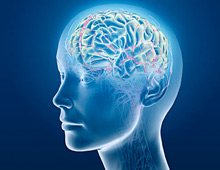
The research team tested the safety and effectiveness of a transvenous phrenic nerve stimulator made by Respicardia. Much like a pacemaker, it sends a regular signal telling the diaphragm to breathe during sleep. Image source: www.sleep-apnea-guide.com
Results from an international, randomized study show that an implanted nerve stimulator significantly improves symptoms in those with central sleep apnea, without causing serious side effects.
Dr. William Abraham, co-lead author and director of the Division of Cardiovascular Medicine at the Ohio State University Wexner Medical Center, presented findings from the study at the recent European Society of Cardiology Congress in Rome. The study is published by The Lancet.
Unlike the more common obstructive sleep apnea, in which the airway partially collapses and causes pauses in breathing, central sleep apnea (CSA) occurs when the brain fails to control breathing during sleep.
“CSA is a serious concern because it affects about a third of people with heart failure, and it’s known to make the condition worse,” Abraham said. “Currently, we don’t have good treatments available. Positive airway pressure devices have been used, but many patients don’t tolerate them well and a recent study showed them to be harmful.”
Abraham, along with lead author Dr. Maria Rosa Costanzo at Advocate Heart Institute in Naperville, IL, led the study at 31 hospitals in the U.S., Germany and Poland.
The research team tested the safety and effectiveness of a transvenous phrenic nerve stimulator made by Respicardia. Much like a pacemaker, it sends a regular signal telling the diaphragm to breathe during sleep.
In the randomized study, 151 patients were implanted with the device. Ten were excluded due to non-study related medical issues or deaths, exiting the study or missing visits. During the first six months of evaluation, 68 devices were activated for treatment, while 73 were left inactive as the control group. Between six and 12 months of follow-up, all patients received the neurostimulation treatment.
Ohio State University Wexner Medical Center
wexnermedical.osu.edu




